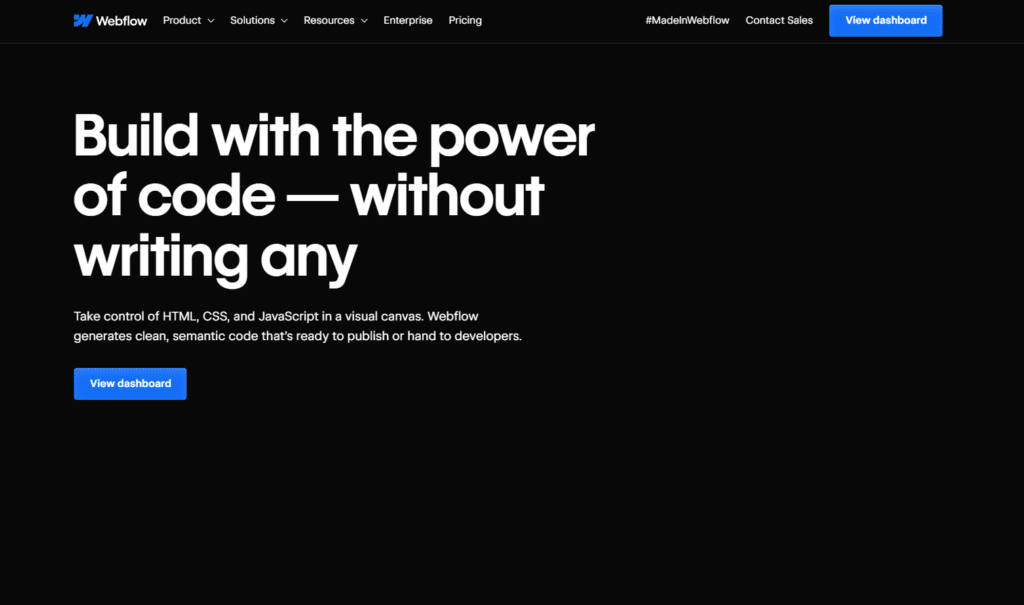WordPress, a name synonymous with developers, marketers, and digital nomads alike. Since its inception in 2023, WordPress has held a majority control over the market, defining how even the tardiest website ideas can be brought to life with little to no complexity. But, that’s about to change!
Today’s world – currently in the middle of the golden digital era, has bigger demands, more complex aspirations, and less time to worry about customization. To fulfill this void, Webflow has emerged as a no-code platform. But is it really all bells and whistles as it claims? Let’s find out!
Webflow vs. WordPress – An Overview

In layman’s terms, WordPress is the simplest way to create your own website or blog. It’s the engine house for over 810 million websites, and that number is only growing. On a technical side, WordPress, licensed under GPLv2, is an Open Source content management system (CMS) that speeds up the process of creating and running websites.
However, new architectures have emerged since then, and while still receiving updates, PHP is no longer considered the very best, due to the emergence of frameworks like Node.js. Claiming to be the web development platform of the future, Webflow is a flexible CMS capable of creating custom, responsive websites without needing to touch the coding part. It uses its engine to translate visual elements into HTML, CSS, and Javascript, dropping the need to use frameworks like React and/or Django.
SEO Capabilities

While claiming to define the future of website development is great and all, at the end of the day, it all boils down to making your website shine in search engine rankings.
Webflow, as seen below, has a very streamlined approach to SEO, promising all the good without you having to lift a finger:
| SEO Aspects | Webflow | WordPress |
| Ease of SEO Integration | Direct editing of SEO settings; no plugins needed for basic SEO controls. | SEO integration via plugins like Yoast SEO for comprehensive control. |
| Customization of SEO Elements | Custom meta titles/descriptions, schema markup, and 301 redirects. | Extensive meta tag customization and schema support through plugins. |
| Speed Optimization | Clean code, lazy loading, image compression for faster loading. | Speed optimization reliant on themes/plugins, e.g., caching plugins. |
| Mobile Optimization | Responsive design templates ensuring mobile-friendliness. | Mobile-responsive themes, with additional plugin support for optimization. |
| Content Management | Plugin-free CMS with custom fields and content-driven layouts. | Powerful CMS with extensive support for various content management plugins. |
| Plugin and Extension Support | Minimal reliance on plugins for SEO, with built-in features. | Extensive range of plugins for SEO and additional functionalities. |
| User-Friendly Interface | Visual, intuitive interface for website building and SEO settings. | User-friendly interface, though learning curve varies based on plugins/themes used. |
| Technical SEO Capabilities | Strong with schema markup, custom code, and 301 redirects. | Robust technical SEO with the right plugins and themes, including advanced schema and redirects. |
| SEO Training and Resources | Offers resources and case studies, but not as extensive as WordPress. | Wider range of SEO training materials, tutorials, and a large community for support. |
| Community and Support | Support through documentation and a growing community. | Extensive community support including forums, tutorials, and professional help. |
Plugins & Tools – Webflow vs WordPress
For our analysis, let’s pit the top three from each platform to see where the difference lies:
- Depth and Range of Features
- WordPress SEO plugins like Yoast SEO, All in One SEO Pack, and Rank Math offer more comprehensive SEO tools compared to Webflow’s offerings like Semflow, Jetboost, and Elfsight.
- WordPress plugins are deeply integrated with SEO functionalities, including:
- Advanced Content Analysis
- Internal Linking Strategies
- Detailed Keyword Optimization
- Webflow’s tools are more basic to intermediate in their SEO capabilities, focusing on essential aspects like on-page optimization and site audits.
- Plugin Maturity and Community Support
- Webflow: Relatively newer and does not have the same magnitude of community-driven development and support, even though they are evolving rapidly.
- WordPress: Benefits from a larger and more established community, with plugins like Yoast SEO having a long history of user feedback and continuous updates.
- User Experience and Ease of Use
- Webflow: More streamlined and integrated, potentially offering a more user-friendly experience, especially for those not deeply versed in SEO.
- WordPress: With its extensive plugin options, WordPress can provide more granular control over SEO, but this can come with a steeper learning curve.
E-commerce and SEO
The application & impact of SEO significantly shifts in the retail sector, with the primary difference lying in the target objectives. E-commerce SEO focuses intensely on product visibility and conversion rates, rather than merely driving traffic.
Therefore, the platform choice can make a difference in how your products are presented, found, and purchased.
Webflow

If lack of customization is taken out of the picture, Webflow could technically be hailed as the go-to platform for e-commerce. It features stable hosting, and site-wide SEO optimizations promising a smooth experience for your customers, regardless of the size of your website and the density of your data.
In terms of design flexibility and site customization, Webflow does offer unique advantages like:
- Intricate Product Page Designs – From Aesthetics to Variations
- Robust Product Showcasing – Boasting Functionality and Effectiveness
Moreover, its uses also extend to areas like payment integrations, making the checkout process smoother for customers. While there is a certain level of customization to the mix, even the base features can significantly affect SEO by reducing bounce rates and increasing user engagement.
Examples of Webflow Websites
- Noonbrew.co: A health-focused site showcasing Noonbrew’s low-caffeine Superfood Organic Tea, featuring a user-friendly design with product carousels, customer reviews, and detailed FAQs.
- Minimalist Space Posters: A visually striking e-commerce platform selling unique space posters, characterized by its stark black and white design and an interface reminiscent of a mission control terminal screen.
- Twigs: An eco-friendly site selling products made of recycled materials, with a design that embraces gentle colors, friendly typography, and paper textures, creating an inviting and organically themed user experience.
WordPress

With its WooCommerce plugin, WordPress is hard to beat in the e-commerce sector. The plugin is deeply integrated with the platform, offering a familiar environment for those already accustomed.
Its impact on SEO is entirely in the hands of its wielder, as it allows for extensive customization and optimization, particularly through additional plugins.
This additional integration can lead to:
- Improved Site Structure
- Better Content Management
- Enhanced User Experience
All of these are integral for e-commerce success, but it’s worth noting that WordPress, unlike Webflow, does not support most features out of the box.
Examples of WordPress Websites
- Shop Root Science: A serene and clean website for Root Science, focusing on natural skincare products, with a layout that reflects their ethos of purity and simplicity in both design and product offerings.
- Porter and York: A premium meat delivery service, Porter & York’s website combines a straightforward and elegant design with high-quality imagery to showcase their fresh, cut-to-order meats.
- Disruptive Youth: An edgy and modern e-commerce site for Disruptive Youth, featuring a sleek design with bold imagery to highlight their trendy swimwear and accessories.
Pros and Cons: Webflow vs WordPress

While it seems like anyone’s game, there are very specific notes that can tilt your favor toward a platform, especially when both of them offer the same in almost every department. However, the answer lies in your approach to SEO, defining your ideas and creativity.
When both platforms are pitted against each other (in areas where they shine), we can reason that Webflow, amongst all arguments, is a superior choice for newbies.
| Pros | |
| Webflow | WordPress |
| Built-In SEO Tools | Over 59,000 plugins for SEO, including specialized tools |
| Automatic SEO Optimizations | Highly customizable with themes and plugins |
| Automatic sitemap generation, Editing of robots.txt | Built-in blogging features like category and author pages |
| Simple Content Management, Simple website structure | Large community support and extensive documentation |
| Responsive Design Flexibility | Wide range of hosting options |
| Visual Design and Development Interface | Freedom to modify and edit the source code |
| Built-In Hosting Solutions | Extensive range of plugins for functionality enhancement |
| Real-Time Editing and Publishing | Strong market presence with a large user base |
| E-commerce Integration | Robust e-commerce solutions with WooCommerce |
| Advanced Animation and Interactivity Options | Access to a wide variety of SEO tools and plugins |
| No Need for Plugins | Multilingual and multi-site capabilities |
| Clean and Efficient Code Generation | Free to use (open-source) with affordable premium options |
However, when it comes to shortcomings, the same platform becomes everything you’d want to avoid as a newbie trying their hand at website creation.
| Cons | |
| Webflow | WordPress |
| Limited SEO Plugins and Extensions | Over-reliance on Plugins for advanced SEO functionality |
| Less Flexibility in Advanced SEO Customizations | Need for constant updates and maintenance of SEO plugins |
| Potentially Higher Learning Curve for SEO Optimization | Hard to get good page speed scores out of the box |
| Fewer Third-Party SEO Tools Integration Compared to WordPress | Complexity and Technicality in SEO Optimization |
| Basic E-commerce SEO Features (for advanced needs) | Risk of using poorly coded plugins affecting SEO |
| Smaller Community for SEO Support and Resources | Vulnerability to SEO issues with theme changes |
| Higher Cost for Premium Features Affecting SEO | SEO effectiveness dependent on theme and plugin compatibility |
However, that doesn’t mean Webflow is bad. Rather, it’s built with ease-of-use in mind, and we witnessed that simplicity comes at the cost of customization.
Verdict
At the end of the day, Webflow or WordPress, both are great platforms. However, the key difference lies in their target audience. If you’re someone looking for speedy website creation with minimal variables to control, then Webflow is your best bet.
However, if you’re an experienced veteran, looking to elevate your site to the best of your knowledge, then the granularity of WordPress is invaluable. Either platform can equip you with good SEO, but the key lies in how you want to optimize your website.